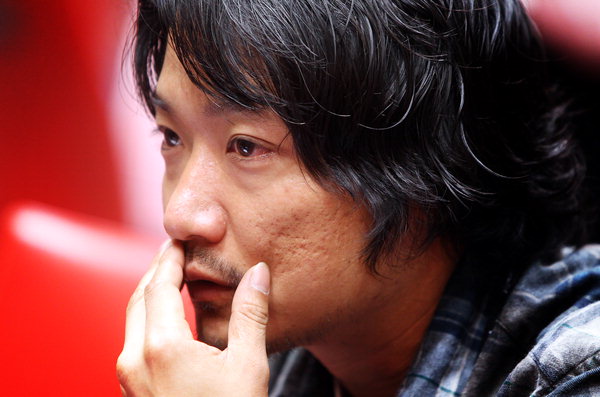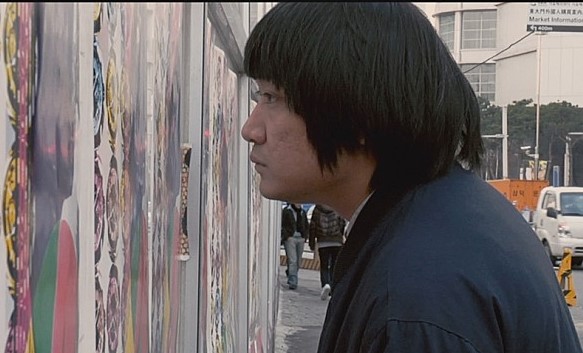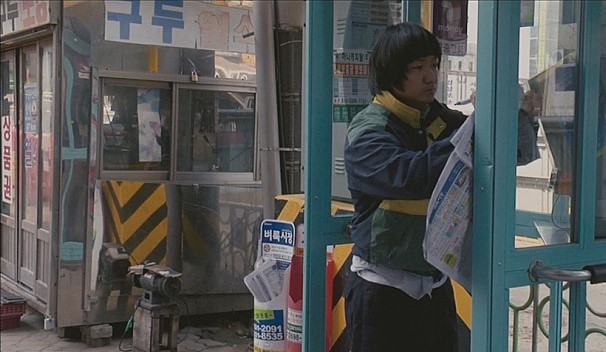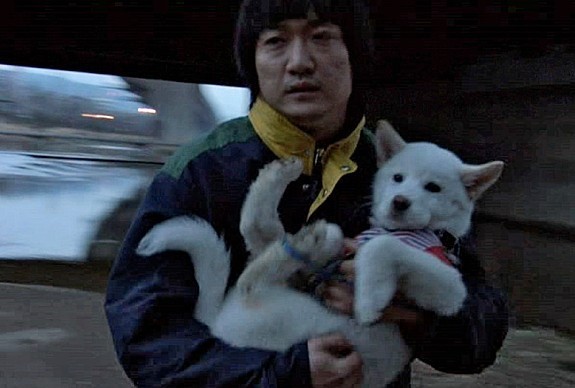"How Should We Live?":
An Interview with The Journal of Musan Director Park Jung-bum
by Adam Hartzell

[This article was originally posted on May 16, 2011, on SF360, an online publication of SFFILM. It is now a dead link on the internet so we have posted it here so it is not lost. It is pretty much the same article with only slight changes, such as a new title. You can search for the original article via the Internet Archives Wayback Machine with the original link - http://www.sf360.org/page/13590]
Eleven directors were in the running for the $15,000 New Directors award 2011's San Francisco International Film Festival, and the jury (Nick James, Daniela Michel, and Marie Therese Guirgis) selected South Korean director Park Jung-bum's The Journals of Musan as the winner. "The unexpected ways that the film fuses the personal with the sociopolitical makes it truly original," they offered, "especially its sophisticated use of imagery and point of view." Director Park was in attendance at the Festival and, before the honor was announced at the SFIFF Golden Gate Awards, I was able to interview him thanks to the arrangement of San Francisco Film Society's Hilary Hart, with Korean translation provided by Jacki J. Noh.
Adam Hartzell: I understand that this film was based on a friendship you had. Could you tell me a little bit about how the film developed?
Park Jung-bum: Jeong Seung-chul is a friend of mine whom I met in 2002 when he came to South Korea from North Korea. He came into our University and he was my friend at school. We both majored in physical education and that's how I met him. He used to play ice hockey in North Korea. He was always very positive and very bright. I felt like we matched. He was more like my younger brother. I felt very close to him and there were times that we lived together. As a friend of his, I naturally met people that he hung out with, other North Korean defectors. So I was able to see their world. It was a kind of darkness within South Korean culture.
Hartzell: So it sounds like the relationship you had with your friend is very different from the portrayal in the movie, but you learned about the more pessimistic experience that North Korean refugees had through your friendship with him?
 Park: That is correct. [North Korean refugees] came to South Korea to be happy. Well, the main reason was because they had nothing to eat there. But you cannot just live with food. You need other things. What they were seeking was general happiness, but what they found was that it's also difficult to find genuine happiness in South Korea as well. South Korea did not allow them to be happy, to seek what they were looking for. So people get really disappointed and some do commit suicide and some were even tying to return to North Korea. And, as you see in the movie, some betray their friends.
Park: That is correct. [North Korean refugees] came to South Korea to be happy. Well, the main reason was because they had nothing to eat there. But you cannot just live with food. You need other things. What they were seeking was general happiness, but what they found was that it's also difficult to find genuine happiness in South Korea as well. South Korea did not allow them to be happy, to seek what they were looking for. So people get really disappointed and some do commit suicide and some were even tying to return to North Korea. And, as you see in the movie, some betray their friends.
But I also saw this [dark side of the experience of North Koreans in South Korea] was a kind of dichotomy that existed in our [South Korean] society. I thought, well, this darkness is not just about them, but also about the very poor people, the people we don't pay attention to or are very difficult for us to meet. So I wanted to throw a question to the audience that with these kinds of people surrounding us, how should we live? What kind of life should we lead?
Hartzell: Your film completed a triptych of North Korean refugee films in San Francisco, The San Francisco International Asian American Festival was a couple months ago, and they showed both Jeon Kyu-hwan's Dance Town and Zhang Lu's Dooman River. Like yours, they are all very pessimistic of the plight of North Korean refugees. Do you see your film as a counterweight to mainstream portrayals of North Korean refugees in South Korea or are most portrayals of that community consistently pessimistic?
Park: I know the director Jeon Kyu-hwan. But I didn't get to see his film. I saw Dooman River. So I am aware that all these movies talk about North Korean defectors. So I am very familiar with [Zhang Lu]. We are close. We talk a lot. What he portrays is from the perspective of Koreans living in China, [coming over] from Yanggang [Province in North Korea]. What I portray is the lives of North Korean defectors in South Korea, what they experience.
 But if I can find something in common between myself and Zhang Lu, we didn't make the films to attract some empathy or sympathy or attention [to the plight of North Korean refugees]. It's more showing the reality of these peoples' lives. We both feel that the most realistic film [is what we should] pursue and try to create. So in that sense, we both agree.
But if I can find something in common between myself and Zhang Lu, we didn't make the films to attract some empathy or sympathy or attention [to the plight of North Korean refugees]. It's more showing the reality of these peoples' lives. We both feel that the most realistic film [is what we should] pursue and try to create. So in that sense, we both agree.
I asked myself this question, How should I live? We have these neighbors that share the same space but there's indifference [towards them]. There is lack of empathy and sometimes we might not even acknowledge that they exist. Is it OK to do that? Is it the correct way or is it wrong? [What is] the meaning behind that? Again, we are living in the same society, same era, same space, yet is it OK to just ignore, is it OK to pretend that they don't exist? And I find that very sad and maybe that's a very selfish [response] that capitalism breeds. So I wanted to report that. These people exist. They are your neighbors. So that's the kind of question that I wanted to ask the audience, but also, it's the question that I ask myself. With these neighbors, how should I live? Interestingly, I get a lot of questions about that via email or questions when we have a screening.
Hartzell: One of the most poignant relationships in the film is with the dog. What were you hoping to show us with that relationship?
Park: This movie started [as] reflection on myself and the memory of Seung-chul, my dear friend. While he was fighting cancer, from which he died, there wasn't much I could do. At that time, I was studying film in graduate school and I was busy just taking care of myself. So I could not really take good care of him, so I felt really bad after he died.
 Around this same period. . . I had a cross-breed dog [like the one in the movie] before I was in grad school. I was very busy studying in school and I would come home late at night so I could not take him for a walk every day. So I felt really sorry for my dog. But one day my dog died of an accident. And after Seung-chul died and my dog died, I started writing this script two years after [those incidents]. I felt really sorry for the dog and for Seung-chul because I couldn't take care of them very well. . . . So this movie was written by the dog and Sueng-chul, in a way. So in the movie, the dog symbolizes ethical salvation or the object of love and consolation and the happiness. It was like the last light, or candlelight. . . . The dog was kind of the ethical guidance, the moral guidance, and principles, and his faith, a guiding light.
Around this same period. . . I had a cross-breed dog [like the one in the movie] before I was in grad school. I was very busy studying in school and I would come home late at night so I could not take him for a walk every day. So I felt really sorry for my dog. But one day my dog died of an accident. And after Seung-chul died and my dog died, I started writing this script two years after [those incidents]. I felt really sorry for the dog and for Seung-chul because I couldn't take care of them very well. . . . So this movie was written by the dog and Sueng-chul, in a way. So in the movie, the dog symbolizes ethical salvation or the object of love and consolation and the happiness. It was like the last light, or candlelight. . . . The dog was kind of the ethical guidance, the moral guidance, and principles, and his faith, a guiding light.
I was very fortunate to find Baek-gu [the dog used in the film]. Lee Chang-dong, my mentor, he also stated that in the film, [Baek-gu] was the best actor, followed by the detective, followed by Sook-young and Kyung-chul. So I asked him 'What about me?' He said, 'Well, you didn't have to do anything. You just stood there, not much dialogue. People just saw your backside and that's about it.' Though he said that as a joke, Baek-gu was such a good actor in the movie.
Hartzell: You just mentioned Lee Chang-dong, with whom you worked on his recent film Poetry. Lee Chang-dong's works all deal with outcasts in South Korea, so I'm curious what you learned from him that you brought to your particular film.
Park: Well, to me, Lee Chang-dong is pretty much everything about movies. I actually memorized all his films and I studied all his films very hard. I think we also share the same type of worldview and same taste. Because of that, I respect and admire him greatly. Maybe it was my destiny that I met him and then I became his assistant director for his film Poetry. What I learned from him is not the techniques of filming or how to approach the audience very well . . . no, that was not it. What I learned from him was why we make movies, how we should look at the world and how we should live. So it's more foundational, basic things then, how we should live as a writer, film director, as a human being. [Plus], what we are supposed to do as a director. What are our duties and responsibilities and missions. I think those are the very important things I learned from him. He's not the kind of person that you ask [a question] and then he throws you an answer. He teaches you how to ask questions, [to ask] questions of yourself. He teaches you the way to ask questions. So if I hadn't met him, hadn't had the fortune to meet him, I probably wouldn't have made a film like The Journals of Musan.
SAN FRANCISCO May 2011